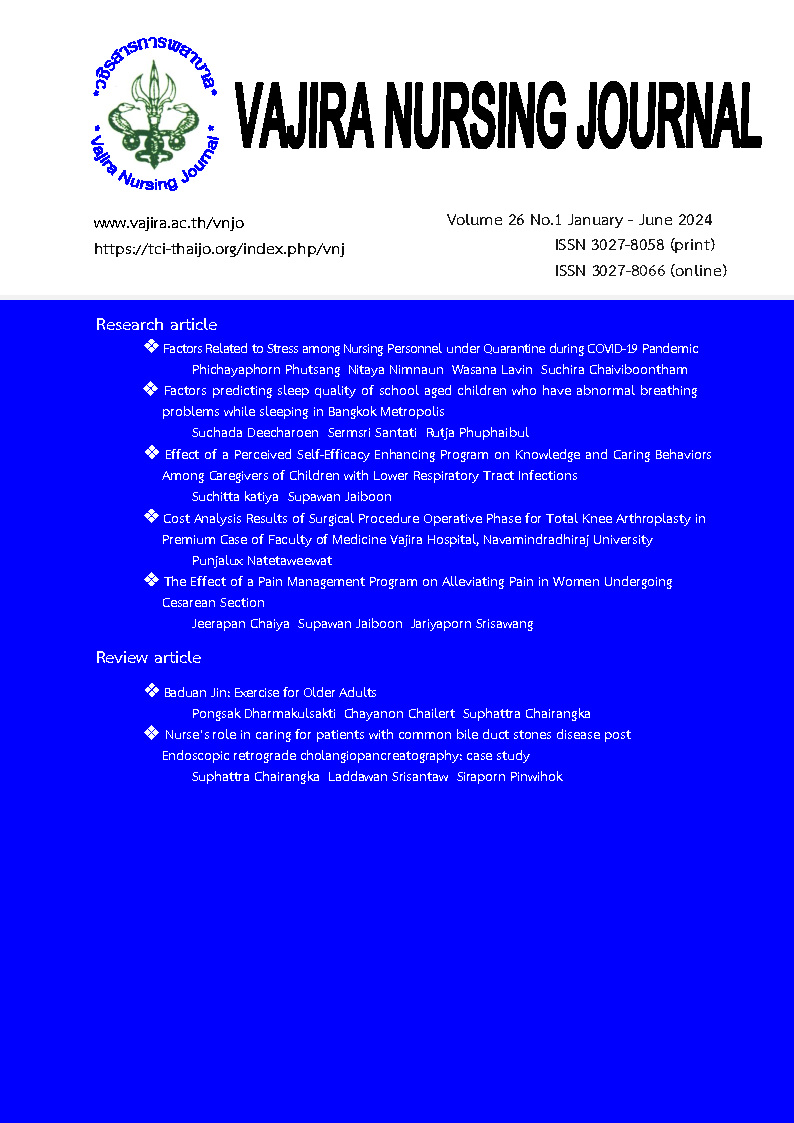ปัจจัยที่เกี่ยวข้องกับความเครียดของบุคลากรพยาบาล ที่ถูกกักตัวภายใต้สถานการณ์การแพร่ระบาดของ โรคติดเชื้อไวรัสโคโรนา 2019 (COVID-19)
Main Article Content
บทคัดย่อ
การศึกษาครั้งนี้เป็นการศึกษาเชิงพรรณนามีวัตถุประสงค์เพื่อหาระดับความเครียดและความสัมพันธ์ของปัจจัยที่มีเกี่ยวข้องกับความเครียดของบุคลากรพยาบาลที่มากักตัวที่ Quarantine ward โรงพยาบาลรามาธิบดีจักรีนฤบดินทร์จำนวน 85 ราย เครื่องมือที่ใช้ในการเก็บข้อมูลได้แก่ 1) แบบสอบถามข้อมูลส่วนบุคคล 2) แบบสอบถามการรับรู้ความรุนแรงโรค COVID-19 3) แบบสอบถามแรงสนับสนุนทางสังคม และ 4) แบบสอบถามประเมินความเครียด วิเคราะห์ข้อมูลโดยใช้สถิติความถี่ ร้อยละ ค่าเฉลี่ยฐานนิยม ส่วนเบี่ยงเบนมาตรฐาน วิเคราะห์ความสัมพันธ์ด้วยสถิติ Pearson's product moment correlation
ผลการศึกษา พบว่า กลุ่มตัวอย่างบุคลากรพยาบาลที่ต้องกักตัวเพื่อป้องกันการแพร่กระจาย โรค COVID-19 จำนวน 85 ราย การรับรู้ความรุนแรงโรค COVID-19 มีค่าเฉลี่ยคะแนนระดับการรับรู้ระดับ อยู่ในระดับรุนแรงมาก (Mean=18.96, SD=2.58) แรงสนับสนุนทางสังคมมีค่าเฉลี่ยคะแนนอยู่ในระดับปานกลาง (Mean=36.01, SD=6.74) และคะแนนความเครียดเฉลี่ยอยู่ในระดับน้อย (Mean=4.21, SD=3.33) จากการวิเคราะห์ความสัมพันธ์การรับรู้ความรุนแรงของโรค COVID-19 ไม่มีความสัมพันธ์กับความเครียดส่วนแรงสนับสนุนทางสังคมมีความสัมพันธ์เชิงลบกับความเครียดอย่างมีนัยสำคัญทางสถิติ (r=-.248*, p=.022) ผลการวิจัยครั้งนี้เป็นความรู้พื้นฐานสำหรับในการประเมินและจัดการปัจจัยที่เกี่ยวข้องกับภาวะเครียดโดยเสริมการให้แรงสนับสนุนเมื่อมีโรคอุบัติใหม่โดยเฉพาะในกลุ่มบุคลากรทางการแพทย์
Article Details

อนุญาตภายใต้เงื่อนไข Creative Commons Attribution-NonCommercial-NoDerivatives 4.0 International License.
เนื้อหาและข้อมูลในบทความที่ลงตีพิมพ์ในวชิรสารการพยาบาลถือเป็นข้อคิดเห็นและความรับผิดชอบของผู้เขียนบทความโดยตรง ซึ่งกองบรรณาธิการไม่จำเป็นต้องเห็นด้วย หรือร่วมรับผิดชอบใด ๆ ทั้งสิ้น
บทความ ข้อมูล เนื้อหา รูปภาพ ฯลฯ ที่ได้รับการตีพิมพ์ในวชิรสารการพยาบาล ถือเป็นลิขสิทธิ์ของวชิรสารการพยาบาล หากบุคคลใดหรือหน่วยงานใดต้องการนำทั้งหมดหรือส่วนหนึ่งส่วนใดไปเผยแพร่ต่อหรือเพื่อกระทำการใด ๆ จะต้องได้รับอนุญาตเป็นลายลักอักษรจากวชิรสารการพยาบาลก่อนเท่านั้น
เอกสารอ้างอิง
Khanna RC, Cicinelli MV, Gilbert SS, Honavar SG, Murthy GV. COVID-19 pandemic: Lessons learned and future directions. Indian journal of ophthalmology. 2020;68(5):703-10.
Alradhawi M, Shubber N, Sheppard J, Ali Y. Effects of the COVID-19 pandemic on mental well-being amongst individuals in society-A letter to the editor on “The socio-economic implications of the coronavirus and COVID-19 pandemic: A review”. International journal of surgery. 2020;78:147-8.
Talevi D, Socci V, Carai M, Carnaghi G, Faleri S, Trebbi E, et al. Mental health outcomes of the CoViD-19 pandemic. Rivista di psichiatria. 2020;55(3):137-44.
Ciotti M, Angeletti S, Minieri M, Giovannetti M, Benvenuto D, Pascarella S, et al. COVID-19 outbreak: An overview. Chemotherapy. 2020;64(5-6):215-23.
World Health Organization. Update on Omicron. [Internet] 2021. [cited 2022 Jul 25] Available from: https://www.who.int/news/ item/28-11-2021-update-on-omicron.
He X, Hong W, Pan X, Lu G, Wei X. SARS-CoV-2 Omicron variant: characteristics and prevention. MedComm. 2021;2(4):838-45.
Tian D, Sun Y, Xu H, Ye Q. The emergence and epidemic characteristics of the highly mutated SARS-CoV-2 Omicron variant. Journal of medical virology. 2022;94(6) :2376-83.
กรมวิทยาศาสตร์การแพทย์ กระทรวงสาธารณสุข. ข้อมูลการจำแนกตามสายพันธุ์ที่เฝ้าระวังและการกลายพันธุ์ของเชื้อ. [อินเทอร์เน็ต]. 2565 [เข้าถึงเมื่อ 12 กรกฎาคม 2565] เข้าถึงได้จาก https://www3.dmsc.moph.go.th/post-view/ 1396.
Wang Y, Shi L, Que J, Lu Q, Liu L, Lu Z, et al. The impact of quarantine on mental health status among general population in China during the COVID-19 pandemic. Molecular Psychiatry. 2021;26:4813-22.
Ganesan B, Al-Jumaily A, Fong KN, Prasad P, Meena SK, Tong RK. Impact of coronavirus disease 2019 (COVID-19) outbreak quarantine, isolation, and lockdown policies on mental health and suicide. Frontiers in psychiatry. 2021;12(565190):1-12.
Department of mental health. Ministry of Public Health. Mental health check in. [Internet] 2022 [cited 2022 Jul 25] Available from: https://checkin.Dmh.go. th/dashboard/ index.php.
Lazarus RS, Folkman S. Stress, appraisal, and coping. New York, Springer; 1984.
ฮูดา แวหะยี. การรับรู้ความรุนแรงและพฤติกรรมการป้องกันโรคติดเชื้อไวรัสโคโรน่า 2019 (โควิด-19) ของวัยรุ่นในเขตตำบลสะเตงนอก อำเภอเมือง จังหวัดยะลา. วารสารวิชาการสาธารณสุขชุมชน. 2563;6(04):158-68
Han L, Zhan Y, Li W, Xu Y, Xu Y, Zhao J. Associations Between the Perceived Severity of the COVID-19 Pandemic, Cyberchondria, Depression, Anxiety, Stress, and Lockdown Experience: Cross-sectional Survey Study. JMIR public health and surveillance. 2021;7(9): e31052.
กรรณิการ์ ดาโลดม, อรนุช ภาชื่น, ฉวีวรรณ บุญสุยา. แรงสนับสนุนทางสังคมภาวะซึมเศร้าพลังสุขภาพจิตและพฤติกรรมการดูแลตนเองของผู้ติดเชื้อเอชไอวีที่มาเข้ารับบริการ ณ คลินิกแห่งหนึ่ง. วารสารคุณภาพชีวิตกับกฎหมาย. 2561;14(2):12-26.
นันทภัค ชนะพันธ์, อัจฉราพร สี่หิรัญวงศ์, ประภา ยุทธไตร, รณชัย คงสกนธ์. ความสัมพันธ์ระหว่าง การสนับสนุนทางสังคมและการรู้จักตนเองกับการคืนความสําคัญให้ตนเองของผู้ป่วยหญิงโรคซึมเศร้า. วารสารสภาการพยาบาล. 2556;28(2):44-57.
Faul F, Erdfelder E, Buchner A, Lang AG. Statistical power analyses using G* Power 3.1: Tests for correlation and regression analyses. Behavior research methods. 2009; 41(4):1149-60.
Division of Public Health Emergency Management. Ministry of Public Health. Lessons Learned from Response to Coronavirus Disease 2019 Outbreak, January 2020-July 2022. [Internet]. 2022 [cited 2023 Aug 1]. Available from: https:// mahidol.ac.th/documents/ covid19.pdf.
Chiraseddhabhon K, Waseeweeras W. The Factors Related to Implementation of Prevention Measure for Coronavirus Disease 2019 in soi Surao Community Ratchathewi District Bangkok Metropolis. Journal of MCU Nakhondhat. 2023;10(1):241-57.
Ruankham P, Kongsin S, Jiamton S, Sattayasomboon Y, Uthis P. Factors Associated with Preventive Behaviors Against COVID-19 SAR-COV-2 among the Adult Population: a Case Study of Chom Thong District, Bangkok Metropolitan. Journal of Health Science of Thailand. 2022;31(2):247-59.
Choi JS, Kim JS. Factors influencing preventive behavior against Middle East Respiratory Syndrome-Coronavirus among nursing students in South Korea. Nurse Education Today. 2016;40:168-7.
Nawsuwan K, Singweratham N, Damsangsawas N. Correlation of perception disease severity to implementation role for control of COVID-19 in communities among village health volunteers in Thailand. Journal of Bamrasnaradura Infectious Diseases Institute. 2020;14(2):92-103.
Tanthanapanyakorn P, Wongpituk K, Ma-Oon K, Ravinit P, Pongkan A. Prevalence and factors related to stress of healthcare providers during COVID-19 pandemic situation of a hospital under the department of medical services, Ministry of public health. VRU Research and Development Journal Science and Technology. 2022; 17(1):111-25.


